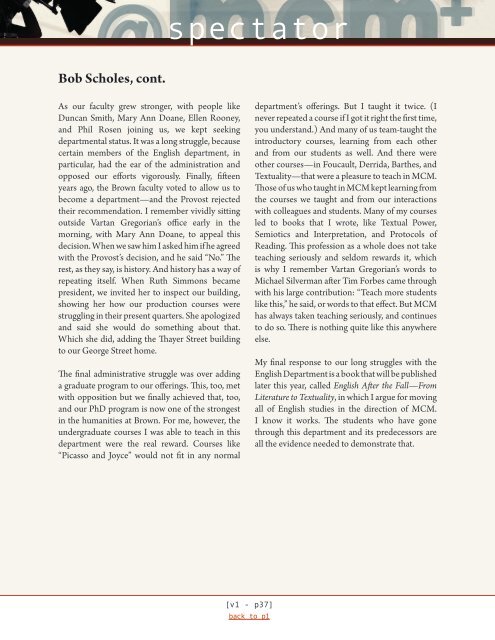Create successful ePaper yourself
Turn your PDF publications into a flip-book with our unique Google optimized e-Paper software.
spectator<br />
Bob Scholes, cont.<br />
As our faculty grew stronger, with people like<br />
Duncan Smith, Mary Ann Doane, Ellen Rooney,<br />
and Phil Rosen joining us, we kept seeking<br />
departmental status. It was a long struggle, because<br />
certain members of the English department, in<br />
particular, had the ear of the administration and<br />
opposed our efforts vigorously. Finally, fifteen<br />
years ago, the <strong>Brown</strong> faculty voted to allow us to<br />
become a department—and the Provost rejected<br />
their recommendation. I remember vividly sitting<br />
outside Vartan Gregorian’s office early in the<br />
morning, with Mary Ann Doane, to appeal this<br />
decision. When we saw him I asked him if he agreed<br />
with the Provost’s decision, and he said “No.” The<br />
rest, as they say, is history. And history has a way of<br />
repeating itself. When Ruth Simmons became<br />
president, we invited her to inspect our building,<br />
showing her how our production courses were<br />
struggling in their present quarters. She apologized<br />
and said she would do something about that.<br />
Which she did, adding the Thayer Street building<br />
to our George Street home.<br />
The final administrative struggle was over adding<br />
a graduate program to our offerings. This, too, met<br />
with opposition but we finally achieved that, too,<br />
and our PhD program is now one of the strongest<br />
in the humanities at <strong>Brown</strong>. For me, however, the<br />
undergraduate courses I was able to teach in this<br />
department were the real reward. Courses like<br />
“Picasso and Joyce” would not fit in any normal<br />
department’s offerings. But I taught it twice. (I<br />
never repeated a course if I got it right the first time,<br />
you understand.) And many of us team-taught the<br />
introductory courses, learning from each other<br />
and from our students as well. And there were<br />
other courses—in Foucault, Derrida, Barthes, and<br />
Textuality—that were a pleasure to teach in MCM.<br />
Those of us who taught in MCM kept learning from<br />
the courses we taught and from our interactions<br />
with colleagues and students. Many of my courses<br />
led to books that I wrote, like Textual Power,<br />
Semiotics and Interpretation, and Protocols of<br />
Reading. This profession as a whole does not take<br />
teaching seriously and seldom rewards it, which<br />
is why I remember Vartan Gregorian’s words to<br />
Michael Silverman after Tim Forbes came through<br />
with his large contribution: “Teach more students<br />
like this,” he said, or words to that effect. But MCM<br />
has always taken teaching seriously, and continues<br />
to do so. There is nothing quite like this anywhere<br />
else.<br />
My final response to our long struggles with the<br />
English Department is a book that will be published<br />
later this year, called English After the Fall—From<br />
Literature to Textuality, in which I argue for moving<br />
all of English studies in the direction of MCM.<br />
I know it works. The students who have gone<br />
through this department and its predecessors are<br />
all the evidence needed to demonstrate that.<br />
[v1 - p37]<br />
back to p1
















